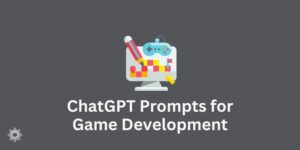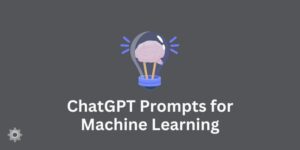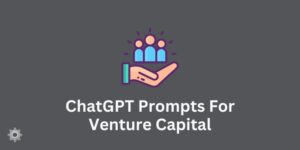In the tech-savvy world we live in today, AI plays an increasingly pivotal role in multiple fields, including Human Resources (HR).
One such AI marvel that has taken the world by storm is OpenAI’s Chatbot, known as ChatGPT.
This conversational AI uses machine learning to generate human-like text, making it an incredible tool for HR professionals.
Also read: ChatGPT Prompts for IT Professionals
This article will delve into the 100 best ChatGPT prompts to aid HR professionals in performing their roles more effectively.
Overview of 100 Best ChatGPT Prompts for HR Professionals
The following prompts are designed to cover a wide range of HR responsibilities, from recruitment and hiring, onboarding and training, to employee engagement, performance management, and organizational culture development.
Each prompt can be used to gain valuable insights, draft emails, create job descriptions, build engaging activities, and so much more.
Recruitment and Hiring: 20 Prompts
Recruitment and hiring form the foundation of HR work. The right prompts can help you optimize your hiring process, enabling you to attract and select the best candidates for your organization.
- “How can I improve my job descriptions to attract more candidates?”
- “Write a job posting for a Senior Software Engineer position.”
- “How can I streamline the interview process?”
- “What are the top questions I should ask a candidate during an interview?”
- “Describe the ideal qualities of a customer service representative.”
- “How can I implement a diversity and inclusion hiring strategy?”
- “What are the current hiring trends in the tech industry?”
- “Write a rejection letter to a job candidate.”
- “What steps can I take to ensure a fair selection process?”
- “Describe a comprehensive pre-employment screening process.”
- “What are the best practices for conducting remote interviews?”
- “How to negotiate salary expectations with a potential hire?”
- “What strategies can improve employer branding?”
- “Suggest ways to enhance candidate experience.”
- “How to create a compelling job ad for social media?”
- “What are the key components of a successful recruitment strategy?”
- “Write an acceptance letter for a job candidate.”
- “How can I use data analytics in recruitment?”
- “What are the benefits and drawbacks of internal hiring?”
- “How can I reduce hiring bias in the recruitment process?”
Onboarding and Training: 20 Prompts
A comprehensive onboarding and training program is essential to equip new hires with the knowledge and skills they need to thrive in their new roles.
The following prompts can guide you in creating a strong onboarding process and effective training programs.
- “How can I create an effective onboarding checklist?”
- “Describe an ideal first day for a new employee.”
- “What are the best practices for remote onboarding?”
- “Write a welcome email for a new employee.”
- “How can I improve employee training programs?”
- “What are the key elements of a successful mentorship program?”
- “How can I measure the effectiveness of training sessions?”
- “What are the ways to make onboarding more engaging?”
- “Write a list of FAQs for new employees.”
- “How can I incorporate company culture into onboarding?”
- “What are the current trends in employee training and development?”
- “How to handle onboarding for a large group of new hires?”
- “Write a detailed onboarding schedule for a new hire’s first week.”
- “What are the common challenges in employee onboarding and how to overcome them?”
- “How can I use technology to enhance training programs?”
- “Describe the role of continuous learning in employee development.”
- “How can I ensure new hires understand their job responsibilities?”
- “What strategies can improve knowledge retention in training sessions?”
- “How to address and reduce new hire turnover?”
- “What role does feedback play in successful onboarding?”
Employee Engagement and Retention: 20 Prompts
Engaging employees and retaining talent is crucial for an organization’s success.
Here are prompts to help you build engagement strategies and create a satisfying work environment that encourages employees to stay.
- “How can I measure employee engagement?”
- “What are the benefits of having engaged employees?”
- “Write a plan for an employee recognition program.”
- “How can I boost employee morale during challenging times?”
- “What strategies can I use to improve work-life balance for employees?”
- “What are the key drivers of employee retention?”
- “How can I create a culture of open communication in my team?”
- “What are the creative ways to celebrate employee milestones?”
- “How to handle employee disengagement effectively?”
- “Write a motivational email to encourage employees during a company change.”
- “How can I promote team collaboration and unity?”
- “What role does career development play in employee retention?”
- “What are the signs of an engaged employee?”
- “How can I support employees’ mental health and well-being?”
- “Describe ways to make remote employees feel connected.”
- “What are the steps to develop a comprehensive employee engagement strategy?”
- “How can I solicit and implement employee feedback?”
- “What are the effective ways to reduce employee burnout?”
- “How to manage and improve employee retention rates?”
- “Write a survey to assess employee satisfaction.”
Performance Management and Evaluation: 20 Prompts
Performance management is about helping employees achieve their potential, and the evaluation process is integral to this. Here are prompts to help you develop fair and effective performance review practices.
- “How can I create a performance review process?”
- “What are the benefits of a 360-degree feedback system?”
- “Write a performance improvement plan for an underperforming employee.”
- “How can I set measurable performance goals?”
- “What are the best practices for giving constructive feedback?”
- “How to handle an employee who disagrees with their performance review?”
- “Write a self-evaluation form for employees.”
- “What are the ways to make performance reviews more effective?”
- “How can I track and measure employee performance remotely?”
- “What are the common pitfalls in performance management and how to avoid them?”
- “How to communicate performance expectations clearly to employees?”
- “What are the elements of a successful coaching conversation?”
- “How can I encourage continuous performance feedback?”
- “Write a script for a performance review meeting.”
- “What are the qualities of effective performance metrics?”
- “How can I foster a culture of continuous learning and development?”
- “What is the role of leadership in performance management?”
- “What are the strategies to manage poor performance?”
- “How can I use performance data to drive decision-making?”
- “What are the ways to align individual goals with company objectives?”
Organizational Culture and Development: 20 Prompts
The culture within an organization can greatly affect employee engagement, satisfaction, and retention.
The following prompts can assist you in developing a positive organizational culture and contributing to your organization’s growth.
- “How can I assess the current company culture?”
- “What are the steps to create a strong organizational culture?”
- “Write a company culture code for a tech start-up.”
- “How can I promote diversity and inclusion in the workplace?”
- “What are the ways to foster a culture of innovation?”
- “What role does leadership play in shaping company culture?”
- “How to manage cultural change during a merger or acquisition?”
- “What are the benefits of a strong organizational culture?”
- “How can I incorporate company values into daily operations?”
- “Write a plan for a company-wide team-building event.”
- “What strategies can help in resolving workplace conflicts?”
- “How can I create a culture of transparency and trust?”
- “What are the ways to promote ethical behavior in the workplace?”
- “How to handle resistance to cultural change?”
- “Write a proposal for a corporate social responsibility program.”
- “What are the signs of a toxic work culture and how to address them?”
- “How to maintain company culture when scaling up?”
- “What is the importance of adaptability in an organization’s culture?”
- “How can I encourage employees to live the company values?”
- “Write a vision statement for a company prioritizing sustainability.”
Conclusion
ChatGPT is a powerful tool that can facilitate many aspects of an HR professional’s role. It can help in brainstorming, planning, writing, and so much more, thus making the job a lot easier.
The prompts listed above are by no means exhaustive, but they provide a strong starting point for any HR professional looking to integrate AI into their work.




